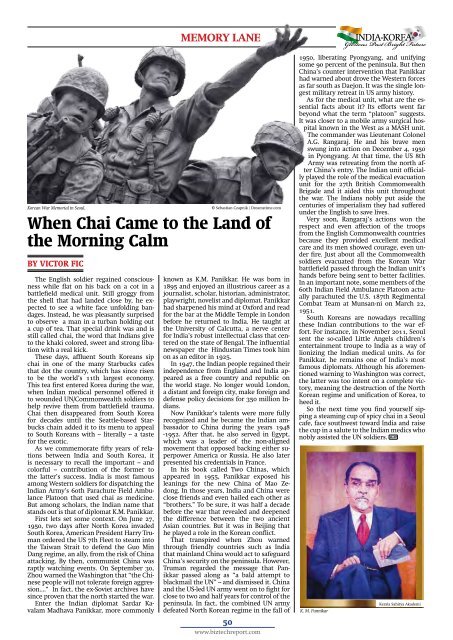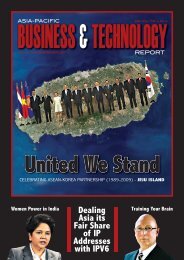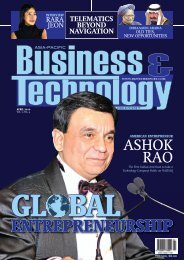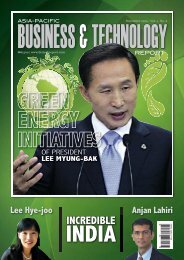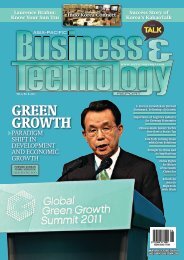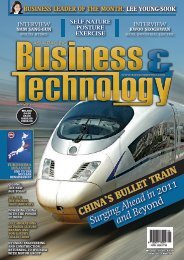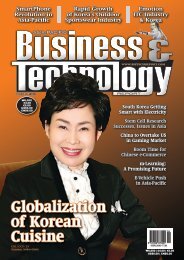INDIA-KOREA - Asia-Pacific Business and Technology Report
INDIA-KOREA - Asia-Pacific Business and Technology Report
INDIA-KOREA - Asia-Pacific Business and Technology Report
Create successful ePaper yourself
Turn your PDF publications into a flip-book with our unique Google optimized e-Paper software.
Korean War Memorial in Seoul.<br />
When Chai Came to the L<strong>and</strong> of<br />
the Morning Calm<br />
by victor fic<br />
The English soldier regained consciousness<br />
while flat on his back on a cot in a<br />
battlefield medical unit. Still groggy from<br />
the shell that had l<strong>and</strong>ed close by, he expected<br />
to see a white face unfolding b<strong>and</strong>ages.<br />
Instead, he was pleasantly surprised<br />
to observe a man in a turban holding out<br />
a cup of tea. That special drink was <strong>and</strong> is<br />
still called chai, the word that Indians give<br />
to the khaki colored, sweet <strong>and</strong> strong libation<br />
with a real kick.<br />
These days, affluent South Koreans sip<br />
chai in one of the many Starbucks cafes<br />
that dot the country, which has since risen<br />
to be the world’s 11th largest economy.<br />
This tea first entered Korea during the war,<br />
when Indian medical personnel offered it<br />
to wounded UN/Commonwealth soldiers to<br />
help revive them from battlefield trauma.<br />
Chai then disappeared from South Korea<br />
for decades until the Seattle-based Starbucks<br />
chain added it to its menu to appeal<br />
to South Koreans with -- literally -- a taste<br />
for the exotic.<br />
As we commemorate fifty years of relations<br />
between India <strong>and</strong> South Korea, it<br />
is necessary to recall the important -- <strong>and</strong><br />
colorful -- contribution of the former to<br />
the latter’s success. India is most famous<br />
among Western soldiers for dispatching the<br />
Indian Army’s 60th Parachute Field Ambulance<br />
Platoon that used chai as medicine.<br />
But among scholars, the Indian name that<br />
st<strong>and</strong>s out is that of diplomat K.M. Panikkar.<br />
First lets set some context. On June 27,<br />
1950, two days after North Korea invaded<br />
South Korea, American President Harry Truman<br />
ordered the US 7th Fleet to steam into<br />
the Taiwan Strait to defend the Guo Min<br />
Dang regime, an ally, from the risk of China<br />
attacking. By then, communist China was<br />
raptly watching events. On September 30,<br />
Zhou warned the Washington that “the Chinese<br />
people will not tolerate foreign aggression....”<br />
In fact, the ex-Soviet archives have<br />
since proven that the north started the war.<br />
Enter the Indian diplomat Sardar Kavalam<br />
Madhava Panikkar, more commonly<br />
MEMORY LANE<br />
© Sebastian Czapnik | Dreamstime.com<br />
known as K.M. Panikkar. He was born in<br />
1895 <strong>and</strong> enjoyed an illustrious career as a<br />
journalist, scholar, historian, administrator,<br />
playwright, novelist <strong>and</strong> diplomat. Panikkar<br />
had sharpened his mind at Oxford <strong>and</strong> read<br />
for the bar at the Middle Temple in London<br />
before he returned to India. He taught at<br />
the University of Calcutta, a nerve center<br />
for India’s robust intellectual class that centered<br />
on the state of Bengal. The influential<br />
newspaper the Hindustan Times took him<br />
on as an editor in 1925.<br />
In 1947, the Indian people regained their<br />
independence from Engl<strong>and</strong> <strong>and</strong> India appeared<br />
as a free country <strong>and</strong> republic on<br />
the world stage. No longer would London,<br />
a distant <strong>and</strong> foreign city, make foreign <strong>and</strong><br />
defense policy decisions for 350 million Indians.<br />
Now Panikkar’s talents were more fully<br />
recognized <strong>and</strong> he became the Indian ambassador<br />
to China during the years 1948<br />
-1952. After that, he also served in Egypt,<br />
which was a leader of the non-aligned<br />
movement that opposed backing either superpower<br />
America or Russia. He also later<br />
presented his credentials in France.<br />
In his book called Two Chinas, which<br />
appeared in 1955, Panikkar exposed his<br />
leanings for the new China of Mao Zedong.<br />
In those years, India <strong>and</strong> China were<br />
close friends <strong>and</strong> even hailed each other as<br />
“brothers.” To be sure, it was half a decade<br />
before the war that revealed <strong>and</strong> deepened<br />
the difference between the two ancient<br />
<strong>Asia</strong>n countries. But it was in Beijing that<br />
he played a role in the Korean conflict.<br />
That transpired when Zhou warned<br />
through friendly countries such as India<br />
that mainl<strong>and</strong> China would act to safeguard<br />
China’s security on the peninsula. However,<br />
Truman regarded the message that Panikkar<br />
passed along as “a bald attempt to<br />
blackmail the UN” -- <strong>and</strong> dismissed it. China<br />
<strong>and</strong> the US-led UN army went on to fight for<br />
close to two <strong>and</strong> half years for control of the<br />
peninsula. In fact, the combined UN army<br />
defeated North Korean regime in the fall of<br />
50<br />
www.biztechreport.com<br />
1950, liberating Pyongyang, <strong>and</strong> unifying<br />
some 90 percent of the peninsula. But then<br />
China’s counter intervention that Panikkar<br />
had warned about drove the Western forces<br />
as far south as Daejon. It was the single longest<br />
military retreat in US army history.<br />
As for the medical unit, what are the essential<br />
facts about it? Its efforts went far<br />
beyond what the term “platoon” suggests.<br />
It was closer to a mobile army surgical hospital<br />
known in the West as a MASH unit.<br />
The comm<strong>and</strong>er was Lieutenant Colonel<br />
A.G. Rangaraj. He <strong>and</strong> his brave men<br />
swung into action on December 4, 1950<br />
in Pyongyang. At that time, the US 8th<br />
Army was retreating from the north after<br />
China’s entry. The Indian unit officially<br />
played the role of the medical evacuation<br />
unit for the 27th British Commonwealth<br />
Brigade <strong>and</strong> it aided this unit throughout<br />
the war. The Indians nobly put aside the<br />
centuries of imperialism they had suffered<br />
under the English to save lives.<br />
Very soon, Rangaraj’s actions won the<br />
respect <strong>and</strong> even affection of the troops<br />
from the English Commonwealth countries<br />
because they provided excellent medical<br />
care <strong>and</strong> its men showed courage, even under<br />
fire. Just about all the Commonwealth<br />
soldiers evacuated from the Korean War<br />
battlefield passed through the Indian unit’s<br />
h<strong>and</strong>s before being sent to better facilities.<br />
In an important note, some members of the<br />
60th Indian Field Ambulance Platoon actually<br />
parachuted the U.S. 187th Regimental<br />
Combat Team at Munsan-ni on March 22,<br />
1951.<br />
South Koreans are nowadays recalling<br />
these Indian contributions to the war effort.<br />
For instance, in November 2011, Seoul<br />
sent the so-called Little Angels children’s<br />
entertainment troupe to India as a way of<br />
lionizing the Indian medical units. As for<br />
Panikkar, he remains one of India’s most<br />
famous diplomats. Although his aforementioned<br />
warning to Washington was correct,<br />
the latter was too intent on a complete victory,<br />
meaning the destruction of the North<br />
Korean regime <strong>and</strong> unification of Korea, to<br />
heed it.<br />
So the next time you find yourself sipping<br />
a steaming cup of spicy chai in a Seoul<br />
cafe, face southwest toward India <strong>and</strong> raise<br />
the cup in a salute to the Indian medics who<br />
nobly assisted the UN soldiers. A-P<br />
K. M. Pannikar<br />
<strong>INDIA</strong>-<strong>KOREA</strong><br />
Glorious Past Bright Future<br />
Kerala Sahitya Akademi


